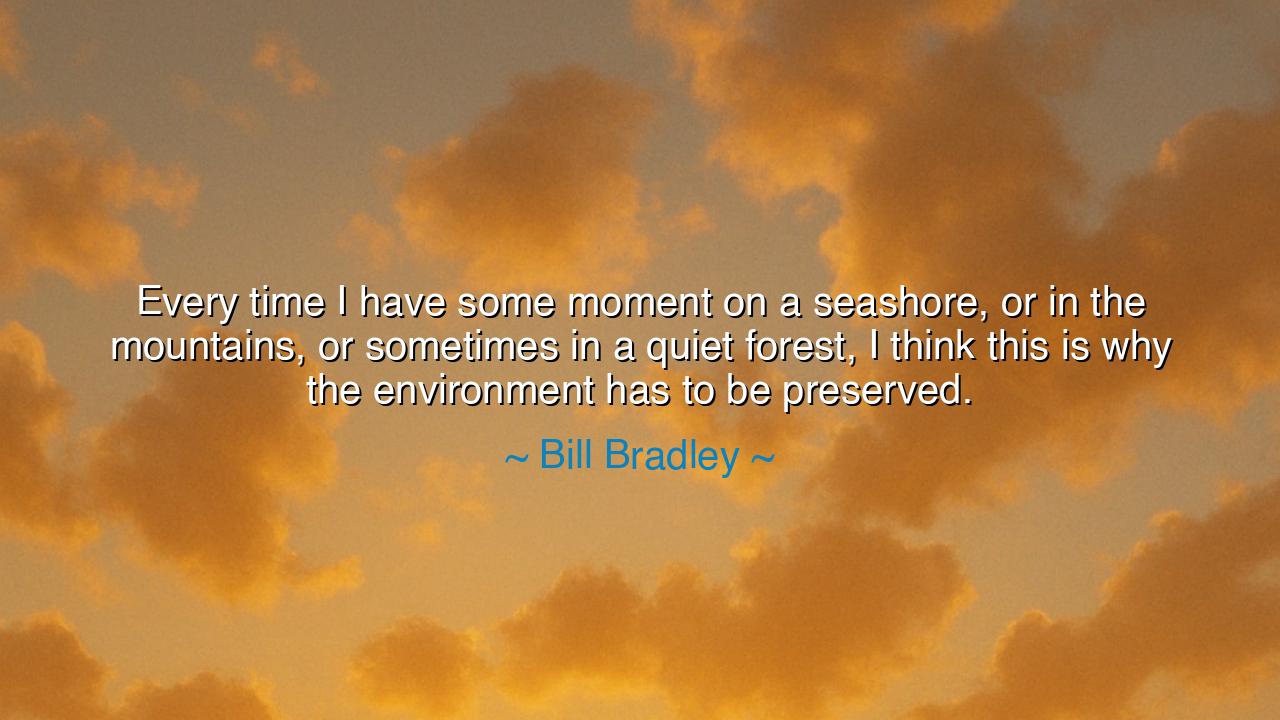
Every time I have some moment on a seashore, or in the mountains
Every time I have some moment on a seashore, or in the mountains, or sometimes in a quiet forest, I think this is why the environment has to be preserved.






When Bill Bradley said, “Every time I have some moment on a seashore, or in the mountains, or sometimes in a quiet forest, I think this is why the environment has to be preserved,” he spoke not merely as a man of reason, but as one who had felt the living pulse of the Earth. In those quiet moments — when the wind brushes across the sea or when the whisper of leaves fills a forest path — the human soul remembers its origin. The world before us is not a possession, but a parent; not a resource, but a sacred inheritance. Bradley’s words awaken in us a sense of remembrance — that the beauty of nature is both fragile and eternal, and that our duty is to protect it so that future generations may also find their peace within it.
In ancient times, the sages often withdrew to the mountains and rivers to find clarity. Lao Tzu, wandering beside the flowing waters of the Han River, saw that the Tao — the Way — flowed just as nature did: freely, patiently, unceasingly. The forest and sea became mirrors to the soul, teaching that stillness, endurance, and harmony are the essence of wisdom. Likewise, Bradley reminds us that moments in nature are not idle pleasures, but sacred revelations. When the heart is quiet enough to hear the song of the wind or the crash of the waves, one feels an unspoken truth — that all life is connected, and that to harm the Earth is to wound ourselves.
There is a profound spiritual humility in such realization. Humanity, in its pursuit of progress, has often mistaken dominion for stewardship. We have paved rivers, cut forests, and darkened skies, forgetting that our existence depends upon the breath of trees and the rhythm of tides. Bradley’s reflection is a plea for remembrance — that the mountains, the seas, the forests are not distant ornaments, but living guardians of our well-being. Each time we stand before them, we are reminded of how small we are, and how immense our responsibility is.
Consider the story of John Muir, the great naturalist who roamed the American wilderness and dedicated his life to the creation of national parks. He once wrote, “The clearest way into the Universe is through a forest wilderness.” Like Bradley, Muir believed that one walk among the pines could teach more than a thousand sermons. It was his reverence, not his science, that inspired protection for places like Yosemite and Sequoia. His efforts were not born of profit or politics, but of love — a love awakened by standing still in the cathedral of nature. From this, we learn that preservation begins in the heart, not in the law.
There are also lessons from civilizations that forgot this truth. The Mayans, the Easter Islanders, and other ancient peoples once flourished among abundant forests and fertile lands. But when greed and blindness overtook their reverence, they exhausted their soil and felled their trees until their cities fell silent. Their ruins are not only reminders of lost glory but of what happens when humankind severs its bond with the Earth. Thus, Bradley’s quote is more than sentiment — it is warning and wisdom. To preserve the environment is to preserve civilization itself.
In every seashore moment, in every mountain silence, we touch eternity. These are the sanctuaries where the spirit of creation still speaks. The sea hums the memory of the first life; the forest breathes the air we share; the mountains stand as witnesses of ages. To walk among them is to step into the story of time itself. When Bradley speaks of why the environment must be preserved, he speaks of preserving meaning — the very sense of belonging that reminds us we are not alone in the cosmos.
The lesson is clear: to preserve nature is to preserve the human spirit. Let us then live as guardians, not conquerors. Let us plant trees where the soil is bare, cleanse rivers that have been forgotten, and protect the fragile lands that still breathe. Each small act of care is a prayer — each decision to protect life, a promise to the generations that follow. The forest’s whisper and the sea’s roar are not calls of the wild, but calls of kinship.
So remember this teaching, and let it settle in your heart: the Earth is not ours to own, but to honor. When you next stand on a seashore, or in the mountains, or within a quiet forest, close your eyes and listen. The world will speak to you — softly, truthfully, eternally — reminding you why it must be preserved. For in saving it, we save ourselves.






AAdministratorAdministrator
Welcome, honored guests. Please leave a comment, we will respond soon